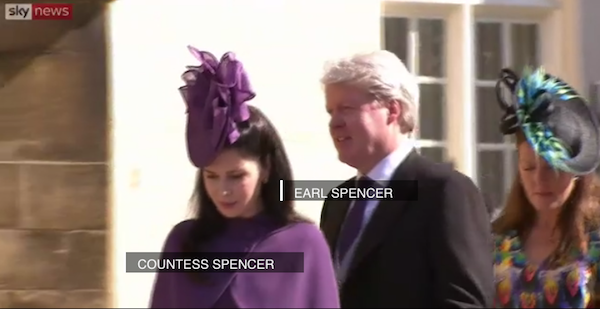"What task are you doing at the moment that you would potentially do better by using a tool?" asked Hugh Westbrook, senior product owner, Sky News at the Broadcast Journalism Training Council event (9 May 2019), held at London South Bank University.
To help the team work more efficiently, Westbrook looks to artificial intelligence for answers.
"It’s going to take the drudge out of the drudge work in many ways. It’s going to free journalists up to have more time to chase stories and create better content," he explained.
In its first AI project last year, Sky News used AI facial recognition technology for a piece they called 'Who’s who'.
Working with machine learning platform Graymeta, it spotted and identified the guests arriving at the UK Royal Wedding 2018. It proved to have both some promising signs and learning curves.

Screenshot of Who's who
"At the moment, these tools are not perfect and they don’t get everything right. If you start to rely on them to give you all of your content, you will start making mistakes," he explained.
The facial recognition technology struggled to deal with a number of variables, from post-operational facial surgery, to identical twins or low-quality, pixelated images. The team were able to overcome these obstacles, but Westbrook said it is a reminder that integrating within your means is important.
"We’re very conscious that we need to introduce these tools in a way that doesn’t get in the way of the journalist doing their job. There’s no point bringing in a tool which is supposedly going to make their life better if that doesn’t exist," he explained.
.@skynews in the #AI space @BJTC_UK
— Jacob Granger (@JPGJournalism) May 9, 2019
- AI is an enabler, not a replacement of journalists. Key to have a human in the loop of image recognition and transcription to produce better content
- Important to understand potential of smart speakers and to make it a two-way conversation pic.twitter.com/HxCQR2zhMd
It is easy to think of AI as something high-tech or futuristic. The reality is that automated tools are more commonplace than we might think and they can make a massive difference to a journalist's workflow.
An obvious example is transcription tools that can be used to pluck out a killer quote from an audio file, instead of sifting through and transcribing copy manually.
Westbrook also suggested that content acquisition is a huge time-saver which means journalists can sift through large media datasets to obtain content they want more quickly. Subtitling automation is also an area where AI could prevent multiple headaches.
While the intersection between journalism and data seems to be narrowing, Westbrook said journalists were not yet required to know Python or Javascript. But it pays for news organisations to have a team of experts in the building.
Our journalism course leaders and lecturers discuss A.I. with Rose Luckin @Knowldgillusion from Institute for Ethical Artificial Intelligence in Education. pic.twitter.com/IW3n8Dyy0m
— BJTC - Industry Accredited Journalism Courses (@BJTC_UK) May 9, 2019
"If people on the tech side do their jobs well, the journalists can have easy access to the tools. The issue is that if you offer a journalist seven steps to get somewhere else, they won’t bother. That’s fair enough too. Asking them to adopt a complicated workflow will not work.
"Our data journalists have the ability to manipulate data and output it in certain ways. For the hardcore coding, journalists won’t need to know that. They need to be aware of how to use the tools and be open to them - research and development will do the rest.
"We live in an exciting time where technology is always impacting our lives, there has never been a better time to be a journalist because the tech allows you to do so much more than you could before.
"It’s about getting more value from creating more content, and there is monetisation around which can offset those initial costs. Even if it simply allows you to get a better story, that automatically gets more people on your service because you have a story that no-one else has."
Free daily newsletter
If you like our news and feature articles, you can sign up to receive our free daily (Mon-Fri) email newsletter (mobile friendly).
Related articles
- From monologue to dialogue: How Sky News is revamping the modern live blog
- Why video journalism is not ready to ditch its editors
- RISJ Digital News Report 2024: Three essential points for your newsroom
- RISJ Digital News Report 2024: Five trends to watch in the UK
- 'My colleagues helped me through the hardest story of my career'










